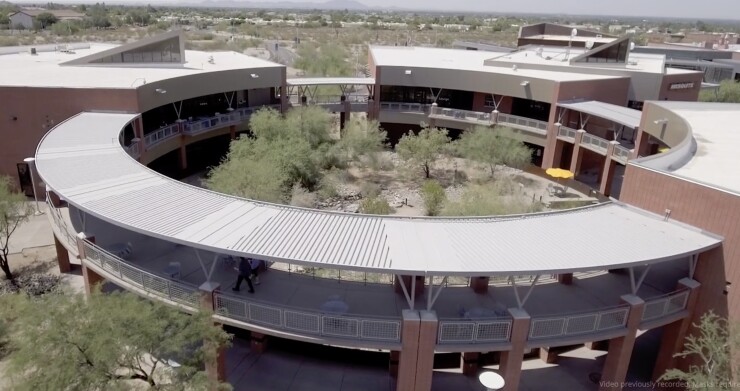As President Biden advocates for free community college, Arizona is on the verge of letting its community colleges compete with four-year universities.
Senate Bill 1453 allowing two-year community colleges to offer baccalaureate degrees has passed both houses of the legislature and awaits Gov. Doug Ducey’s signature. Ducey has not said whether he would sign the bill that passed the Senate Thursday on a 24-6 vote.
The chief opponent of the measure is the Arizona Board of Regents that governs the state’s three public universities. The Regents have been fighting efforts in the legislature to expand community colleges to four-year colleges since at least 1998.

Republicans in the GOP-controlled Senate carried the bill, but faced some Democratic opposition.
“My concern is how tuition and fees will eventually increase at our community colleges — unintended consequences,” said Sen. Rosanna Gaboldon, D-Sahuarita, who voted against the bill.
“Arizona is already underfunding our public education, and I believe that this bill will make our community colleges and our universities compete for that same funding. Why make this a solution looking for a problem?”
Sen. Christine Marsh, D-Scottsdale, a former Arizona Teacher of the Year, said she voted for the bill with misgivings.
“I went to a community college before transferring and I thought it was a tremendous experience,” she said. “However, I worry that this is essentially robbing Peter to pay Paul. And the fact is that both the universities and the community colleges are woefully underfunded, and we are codifying a system of higher ed entities forced to cannibalize limited resources.”
Sen. Tyler Pace, R-Mesa, who called himself the only Republican to vote “no” on the bill, said he sees education needing a more profound overhaul.
“We can learn faster than ever before,” he said. “I think we should be speeding people through the education system and quit focusing on this antiquated idea that it takes four years to get a degree.”
The legislation would not require community colleges to offer four-year degrees but lays the groundwork for those that want to. Community colleges in populous Maricopa County, which includes Phoenix and its suburbs, have shown the most interest in growing beyond the two-year associates degree.
“My concern has always been that the funding mechanism for the two systems is very different,” said Sen. J.D. Mesnard, R-Chandler, who teaches at both Arizona State University and Mesa Community College. “I realize that there are some protections in our property taxes, but those can be changed.”
The increasing competition for students would come as the numbers of U.S. high school graduates is expected to plateau and begin falling after 2025. The COVID-19 pandemic has also led to new online courses that compete with brick-and-mortar campuses.
The Western Interstate Commission for Higher Education, or WICHE, anticipates 3.93 million of high school graduates in 2025 with a moderate decline over the following decade.
Before SB 1453 was under consideration, Moody’s Investors Service placed a negative outlook on the University of Arizona’s Aa2 credit, citing a “thin operating performance and reduced liquidity, providing a more limited margin to adapt to a more challenging and volatile operating environment over the next several years.”
“Achievement of goals will be more difficult in the face of broader macro-economic headwinds,” Moody’s analyst Roy Eappen added in the Oct. 2, 2020 report.
The Arizona Board of Regents also governs Arizona State University based in Tempe, and Northern Arizona University based in Flagstaff.
Under SB 1453, a community college would first need a district governing board to determine if there is a local workforce need for the four-year degrees. A study of the costs and the availability of a similar degree from other Arizona colleges are also required.
Community colleges in populous Pima and Maricopa counties could offer no more than 5% of their degrees at the baccalaureate level for the first four years. After that, the cap could rise to 10%.
Pima Community College charges $1,305 for 15 credit hours. Maricopa Community Colleges charge a flat rate of $1,020 per semester.
Tuition at state universities ranges from $9,000 to $12,000 per year.
Carrying much smaller debt loads and enjoying support from property taxes, community colleges tend to see enrollment vary with the economy.
S&P Global Ratings affirmed its triple-A rating for Maricopa County Community College District and stable outlook on April 1, 2020.
Under Biden’s plan outlined last week before Congress, the federal government would provide $109 billion for two years of free community college. The Biden plan calls for the federal government to pay for about 75% of the cost of two years of community college, leaving states to pay for the rest.
One Arizona community college district already provides free tuition to students. At Mesa Community College in Phoenix’s largest suburb, Mesa high school graduates with a 2.0 grade-point average or higher can attend Mesa Community College for two years at no cost.
Mesa Community College's interim president Lori M. Berquam, announced that the first Mesa College Promise eligible high school graduates will receive funding to attend MCC beginning with the fall semester.
The Biden plan would also add an $80 billion investment in Pell Grants that would increase the maximum award by $1,400. The maximum award is $6,495 for 2021-22.
A $39 billion program under Biden's plan would provide two years of subsidized tuition for students from families earning less than $125,000 enrolled in a four-year Historically Black College or University, tribal college or university, or minority-serving institution. An additional $5 billion would expand existing institutional aid and grants at the colleges. A $62 billion investment in evidence-based programs and initiatives would “strengthen completion and retention rates at community colleges and institutions that serve students from our most disadvantaged communities.”
Scholarships for future teachers would double from $4,000 to $8,000 per year. Biden proposes investing $2.8 billion in year-long, paid teacher residency programs; and targeting $400 million for teacher preparation at minority-serving institutions and $900 million for the development of special education teachers.





